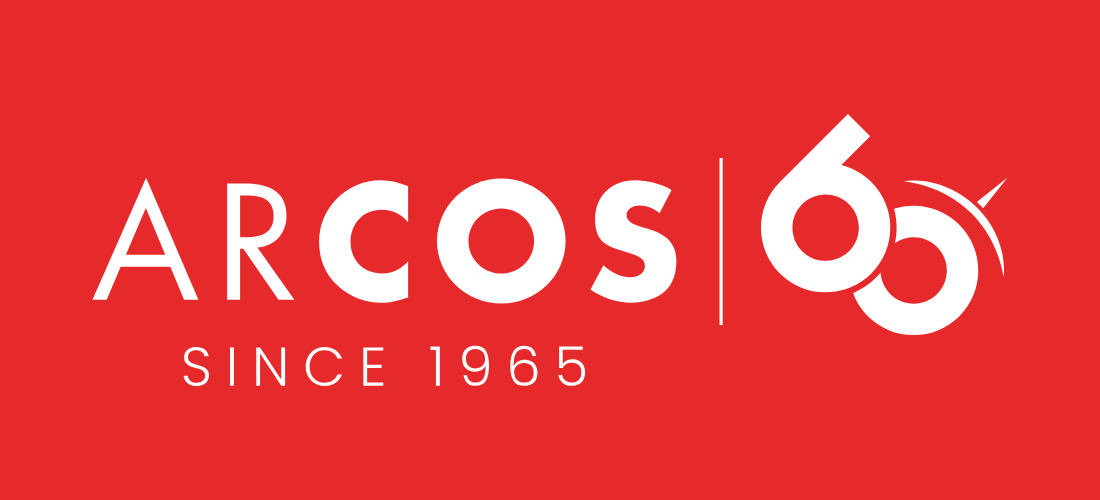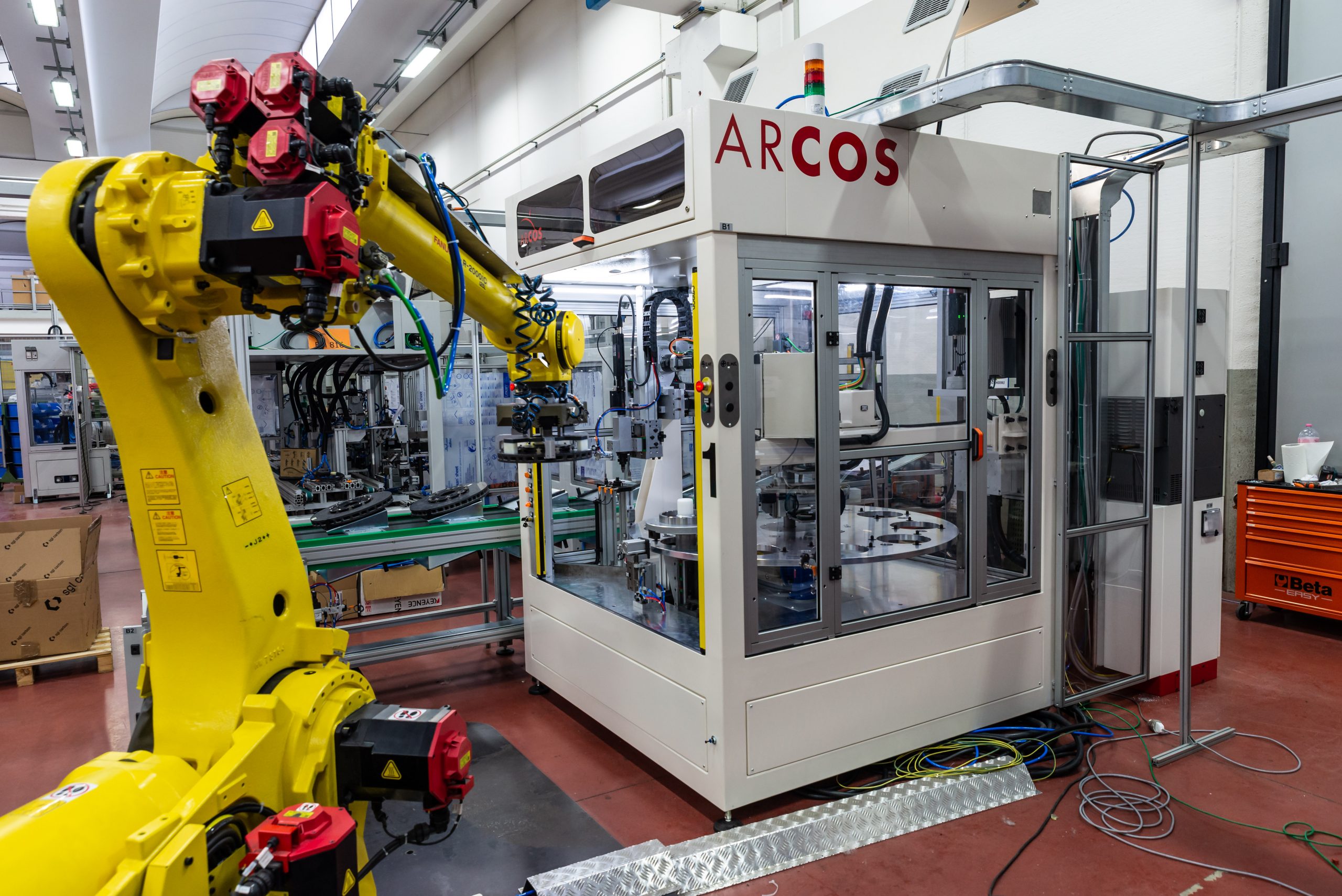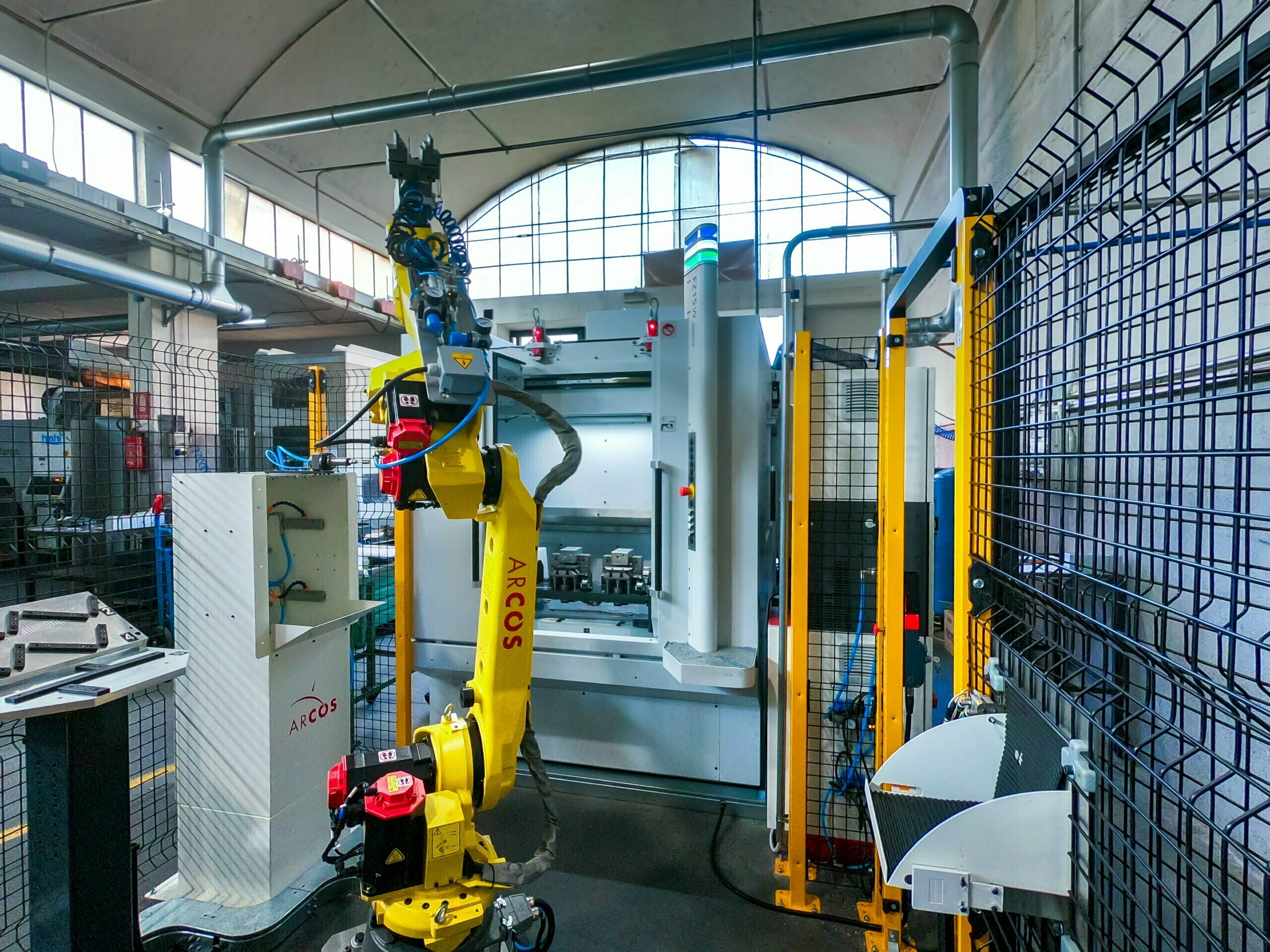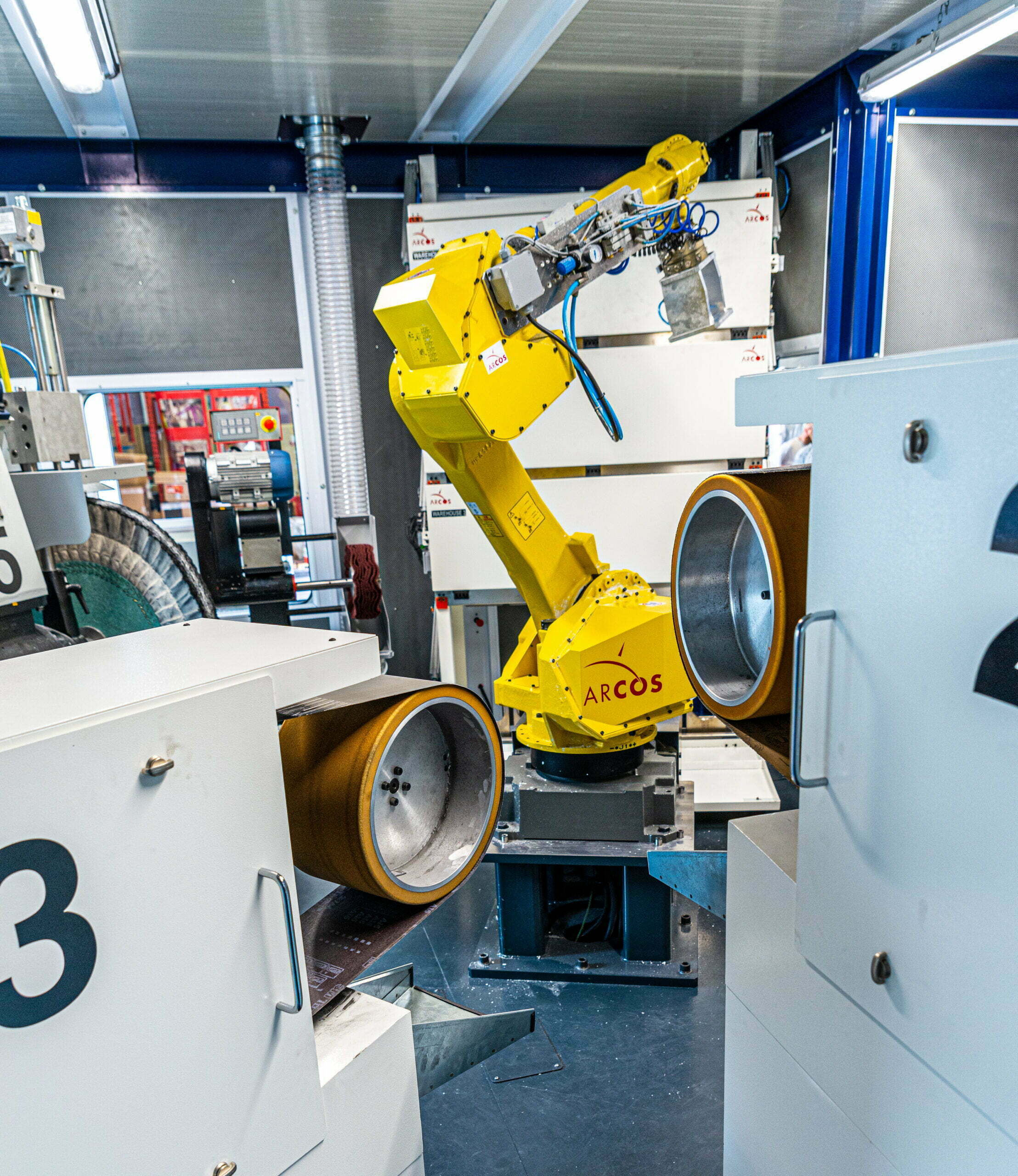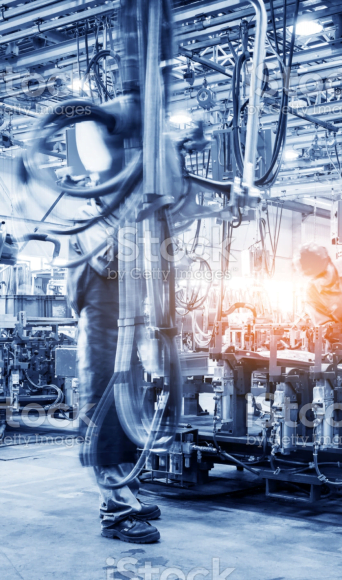
The development of Industry 4.0 has greatly spread the use of industrial robotic automation systems, even in small companies.
The need to increase efficiency in production and develop new business paths has meant that, in the industrial sector, mechanical robots have reached such an importance that it is almost impossible to imagine doing some jobs without their help.
In this article, Arcos offers an overview of industrial robotic automation and what benefits it can bring to your company.
Table of Contents
What is industrial robotic automation?
To understand what industrial robotic automation is and how it works, it is necessary to separately analyze the terms that compose it.
The term industrial automation identifies the use of technologies and control systems for the intelligent management of industrial machinery and production lines. Industrial automation, therefore, is about the control of physical processes: it involves the use of physical machines and control systems to automate activities within an industrial process.
Industrial robotics is a secondary branch in industrial automation and helps manufacturing in some processes such as machining, deburring, grinding, laser grinding, grinding etc.
A robot is a reprogrammable, autonomous or semi-autonomous multifunction machine, capable of performing a series of tasks alongside or in place of humans. It can perform exclusively mechanical and repetitive tasks, manage objects through previously programmed movements; or it can adapt its behavior to the surrounding environment thanks to the artificial intelligence that acquires data, processes them and modifies the inputs to the machine, optimizing work.
Process robotization is an automation strategy that can be defined as the application of technologies that allow the management and control of the process, standardizing processing and obtaining production increases, lower costs, greater precision and reliability.
Consequently, it is possible to state that industrial robotic automation involves the realization of industrial work through the use of automatic systems, robots, and an automation system that replaces the man in the assembly line, always carrying out the same work, in a constant and frenetic pace.
Multiple fields of application and current and future developments are outlined for this technology, especially many advantages for those who automate industrial processes.
The development of industrial technology up to advanced robots
The level of efficiency and advanced technology that can be counted on today derive from a series of evolutions, adaptations and implementations that industrial machines have acquired over time, up to being able to rely on autonomous robots 4.0.
Starting from the first industrial revolution around the eighteenth-nineteenth century, the first machines were developed to facilitate dangerous operations carried out by man, operated by mechanical energy. With the second industrial revolution, the advent of electricity upsets the industrial sector which not only introduces a new way of working defined by the assembly line, but increases the pace of production by making it mass.
It was in the second half of the twentieth century that the automation of some processes began thanks to the introduction of electronics and information technology in the workplace. For the first time, the number of operators present in the factory is reduced, favoring man-machine integration and collaboration.
The turning point in the industrial sector comes in more recent times, with the arrival of Big Data, artificial intelligence and machine learning: all technologies that determine the autonomy of the machine in carrying out the work, without the need for human intervention. The resulting benefits are significant both for the staff and for the growth of the company.
Automation and Robotics: what are the advantages for companies?
There are considerable advantages in the implementation of automated robotic processes and certainly they must be identified in productivity, consistency and efficiency:
- Staff can spend more time on activities that have a greater impact on the business.
- The movement of particularly heavy or toxic objects or materials can be entrusted to robots and automated processes.
- The robots are placed in hazardous environments for humans, for example, avoiding contact between electrical components and harmful materials.
- Reduces the risk of oversights and errors. Repetitive activities are done the same way, every day. You can be sure when processes, tests, updates and workflows will take place, how long they will last, and how consistent the results will be.
- Business productivity is increased thanks to the constant and tireless use of robotic automation, shortening production times.
What are the applicative technologies of industrial robotics?
There are certainly many advantages, but for which processes?
Industrial robots can be used both in rigid automation systems, in which production takes place in series and with constant characteristics, and in flexible automation systems, in which the products are variable.
In addition to the transport, handling and measurement capabilities of industrial robots, the most interesting application is certainly that of manufacturing in which the material changes its original characteristics.
Arcos offers various automation systems that can adapt to multiple production sectors, in fact, the long experience gained and the specific skills developed, combined with the use of cutting-edge technologies, allow Arcos to offer effective solutions that adapt to any production need.
Arcos provides simple and efficient solutions for all those applications where automated processing of the material is required such as sandblasting, deburring, polishing, cutting, grinding, laser grinding and enslavement.
The assistance of Arcos allows you to create ad hoc solutions to customize these processes for various sectors and products, such as the production of clutch discs, the laser marking of shotgun barrels, the 2D vision system for the processing of eyeglass frames, the robotisation of presses for molding and injection of plastic materials and many other projects designed specifically for the needs of customers.
The strategic advantages of integrating robotics and automation in production processes
Resurgence of Internal Production (Reshoring)
In a competitive context where companies face competition from markets with lower labor costs, robotics emerges as a powerful strategic ally. Indeed, the use of robots allows a significant reduction in production costs and increased efficiency, enabling companies to compete sustainably, secure higher-value orders, and bring back previously outsourced processes in-house.
Increased Productivity and Profitability
The adoption of robots offers companies the opportunity to significantly increase production rates. This translates into cost optimization and an overall improvement in the profitability of production processes. Improved working conditions for employees and the assurance of high-quality production are tangible results.
New Job Opportunities
The introduction of robots in production plays a key role in triggering job expansion. According to estimates by the International Federation of Robotics (IFR), the implementation of over 3 million robots in the coming years could generate at least 20 million new jobs. This outcome results from the synergy between reduced production costs (allowing companies to invest in human resources) and increased productivity and efficiency, leading to greater demand for labor to cope with growing orders.
Strengthening Skills through Reskilling and Training
Robotics not only automates repetitive and dangerous tasks but also involves a redefinition of the skills required from workers. The acquisition of new skills, such as engineering, programming, equipment management, and maintenance, enables employees to access more rewarding and high-value-added roles. This process of reskilling enhances the value of personnel skills, improves the company’s workforce, and consolidates its competitiveness in the market.
What to expect in the future of robotics?
The prospects for the development of industrial robotics in the near future are oriented toward a synergistic approach, where the convergence of different technologies plays a central role. The widespread adoption of artificial intelligence, machine learning, and cloud computing, recognized as fundamental software advancements in recent years, joins the dissemination of increasingly advanced and autonomous forms of robotics, such as cobots and AMRs (Autonomous Mobile Robots), outlining a highly probable application direction.
These forms of robotics demonstrate increasing ability to autonomously perform predetermined tasks while simultaneously learning from the surrounding environment, adapting their operational parameters in response to emerging variations within the production process.
A crucial factor in realizing these prospects lies in the evolution of new and more efficient methodologies for processing Big Data, with the aim of extending these capabilities even to small and medium-sized enterprises. Only through full access to vast, well-structured, and verified databases will it be possible to develop the solid informational foundations necessary to fully address and implement this promising future of robotics in the industry.
Conclusion
Industry 4.0 is bringing more and more technological innovations to the center of production processes, effectively enriching the skills of people who are in close contact with the new intelligent systems. It is not a question of robotic innovation that fits individually within the production chain, but of an integrated workforce that contributes to exponentially increase the efficiency and productivity of companies.
Arcos is the demonstration that industrial robotic automation can be the ideal solution to allow you to accelerate the innovation of your production reality. If you also want to bring your company to industry 4.0, do not hesitate to contact us, our team of experts will be at your complete disposal.
